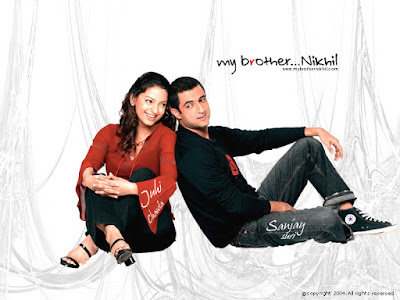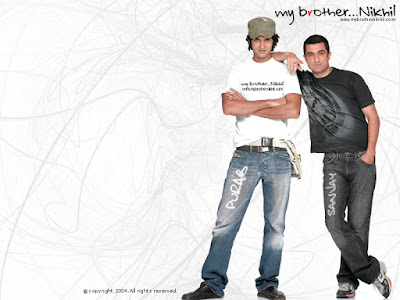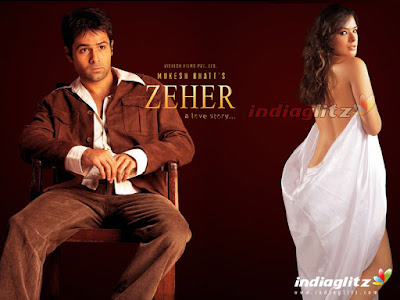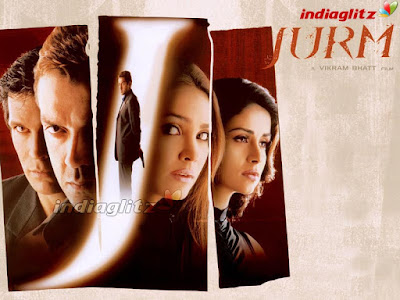


Zeher

Jurm – It Happened One Night

Pulp Reigns – Sky Captain & The World of Tomorrow
It’s the 1930s. Newspaper reporter, Polly Perkins (Gwyneth Paltrow) is investigating the disappearance of six scientists. She discovers that the brain behind this, is a certain Dr. Totenkopf who has plans for the world. She joins forces with an old flame, Joe ‘Sky Captain’ Sullivan (Jude Law) and with a little help from his techie friend, Dex (Giovanni Ribisi), they’re off on the trail of the evil mastermind.
The situations change rapidly, from giant robots (and I mean GIANT) walking the city streets to a dynamite-filled mine in Nepal to a mobile airstrip under the command of the eye-patched Captain Franky Cooke (Angelina Jolie) and finally concludes with a modern-day ark. Along the way, we find dinosaurs, aircrafts that mimic bird flight complete with wing-flapping, a mysterious companion of the elusive Dr. Totenkopf, ray guns and innumerable robots (alright, not quite as many robots as in I-Robot or Matrix Revolutions, but just about enough to add sheen).
Unlike other action heroes, Sky Captain doesn’t wear a signature outfit or have a key phrase. He has no supernatural powers, but is extremely determined and courageous.
As for performances, there’s an excellent rapport between Jude Law and Gwyneth Paltrow as the opportunistic, argumentative lead characters. Their banter is witty and each character is constantly trying to undermine the other.
Ultimately, it’s Polly Perkins’ indecision about the usage of the last shots in her camera, the brave Sky Captain’s dependence on Milk of Magnesia, Dex’s brilliance with anything technical, and Franky Cook’s gutsiness, that keep one riveted to the seat. There’s no violence of the blood-and-gore kind, no profanity and no steamy scenes either. Add to that, a narrative that doesn’t flag, but hurtles on to a fantastic finish. Ultimately, it’s the combination of the imagination of the 1930s, coupled with today’s special effects, that works to the movie’s favour.
Oh! And did I mention that all the action described above, barring the actors and a few props, was primarily special effects? And that Sir Laurence Olivier is Totenkopf?
TRIVIA
Sky Captain is in the pulp-magazine genre, named after the inexpensive pulp that was used to make the paper that the magazines were printed on. Primarily focusing on romance, westerns, detective, war and science fiction, this genre set the stage for such greats as Edgar Rice Burroughs’ Tarzan, Street and Smith’s Doc Savage and The Shadow.
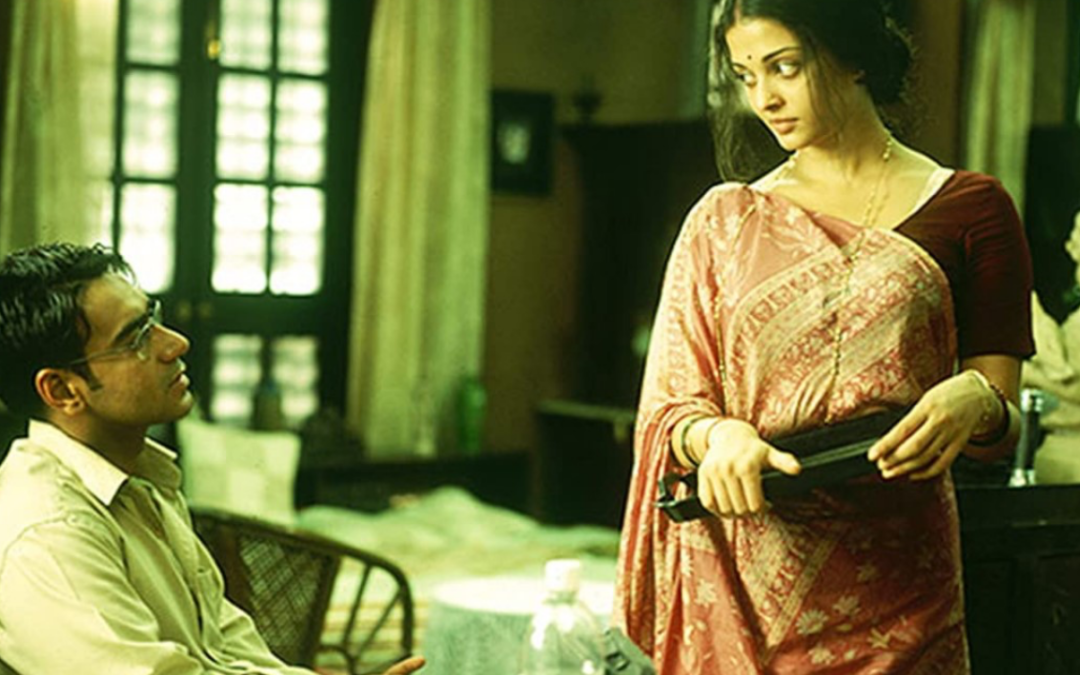
Raincoat – Love & Longing in Kolkata
As is apparent, there are no muscle-flexing heroes and demure heroines. There are also, no dangerous liaisons, no gun-toting villain and no item numbers. Not even one lusty exhalation. So, a lot of people are likely to be sorely disappointed and are better off missing the movie entirely.
Ash in a de-glamourised get up, is a topic that’s been done to death. Believe you me, that is not reason enough to watch this movie – it’s something you’ll outgrow within the first half-hour into the movie.
At its most basic level, Raincoat is slow & sensitive. If you must, watch it for Mannu, Neeru and the ambience of a rainy afternoon.
Mannu (Ajay Devgan), travels from Bhagalpur to Calcutta to get seed capital from his friends, for a business he wishes to begin. Right through the movie, Mannu’s character is devoid of bravado, but is self-assured in his own way, with just that hint of naivete. He stays with one of his friends (Sammeer), whose wife (Mouli Ganguly), is empathetic to Mannu’s predicament and is intuitive about his feelings for an old love, Neeru, whom he wishes to drop in on while in Calcutta. Six years ago, circumstances had pulled Mannu and Neeru apart, with Neeru marrying a person of her parents’ choice.
The movie is centered on Mannu’s visit, on a rainy afternoon, to the house where lackadaisical Neeru (Aishwarya Rai) lives, in South Calcutta. Through the short flashbacks, we are let in on their relationship, the contrast between who she was and who she has become. The Neeru that Mannu loved, was a sprightly lass with a tad of mischief in her. The Neeru he sees now, has aged prematurely, with dark circles under her eyes and is completely oblivious of her appearance. There is an aura of hopelessness that seems to hang over her, despite her assurances of being happily married. Aishwarya Rai deserves appreciation in the way she has subtly used body language and mannerisms to transform herself into Neeru. Ajay Devgan is at times the helpless failure, complete with stoop and sometimes, in front of Ash’s character, he does an excellent make-believe of the now-successful man she lost out on.
There is no rekindling of romance between Mannu and Neeru. But there’s a refreshing innocence in their relationship with both characters building a house of cards with regard to their respective lives. It takes a visitor (Annu Kapoor), with his revelations, to upturn it. And in the midst of all this, the said raincoat plays a small but pivotal role.
Sammeer is adequate in his role of Mannu’s friend. Mouli Ganguly lends subtlety to her role as his wife. Surekha Sikri, as Mannu’s mother, has a very short but adequate role. Annu Kapoor brings a certain zest to the otherwise dank atmosphere.
As for music, there are no sequences dedicated to song, only snatches that waft in and out of the scenes, like the varying intensity of the monsoon. It’s interesting to see how the music has been incorporated in the scenes, without drowning out the dialogues. Shubha Mudgal gently sets the mood with soulful rendition of songs written by Rituparno Ghosh and set to tune by Debojyoti Misra.
The narrative is sedate, reminiscent of Bengali cinema of the Ray genre, but it’s really fine even if you haven’t seen Bengali cinema before. There’s no major twist in the end, and halfway through the movie, many will guess the short story that inspired this movie. But hang on, and watch it. It’s not every day that we watch a truly inspired movie, sans the double apostrophes.
Raincoat is like a monsoon raaga, replete with tender longing, yet righteously understated in its treatment.
TRIVIA: Rituparno Ghosh made his first movie at the age of 23, and his first full length feature film, Unishe April, won many awards. More recently, he directed the much-acclaimed Chokher Bali. What’s interesting is that Raincoat is his first movie in Hindi, and he has managed to create an interest in Bengali Cinema by capturing its pace and ambience.
(edited version published on January 1, 2005 in Madras Plus, the city features supplement of The Economic Times, Chennai)

Musafir- Should be so lucky
At the heart of the story, Lucky is – you guessed it – unlucky with money. It keeps slipping out of his reach at every step. Coming to think of it, he’s not all that lucky with his women either.
Sanjay Dutt steals the ceetees with the best lines although his chhuri-twirling gets a bit excessive. Although Anil Kapoor turns out a good performance, his scruffy and unkempt get-up is overshadowed in by the stylish larger-than-life persona of the other characters.
Sameera Reddy is indeed the next Zeenat Aman. She manages to emote quite well, in the midst of all the skin show. She writhes in agony, ecstasy and item numbers with equal skill.
Mahesh Manjrekar, looking very much the unhulky Hulk Hogan with the sideburns, brings Luka’s character alive with his idiosyncrasies and plain-talk.
Some of the scenes between Manjrekar and Reddy, especially the rape, could have been avoided. They slacken the pace especially in the Rashomon-esque sequence where both narrate different versions of a flashback.
Koena Mitra is wooden during the dialogue sections, but comes alive during the item numbers, including one song involving a purple dress, a car and soap suds. Yup, Liv Tyler in One Night at McCools. And yes, those were indeed coins on her dress in the song ‘Saqi Saqi’!
Aditya Panscholi has never looked better. Shakti Kapoor is wasted in a small role.
The background score by Sandeep Chowta is slick, but intrusive in scenes with dialogues. Vishal-Shekhar’s music is zippy and pulsating, with a dash of techno. Rabba is a slow number, has a moderate Kaante hangover but is picturised well. Sanjay Dutt goes off-key for Tez Dhaar, but this is the song that plays in one’s head long after the movie is over.
P.S. Vinod (cinematography) and Tinu Verma (action) deserve kudos, while Bunty Nagi could have tightened the editing a trifle. Bosco Caesar’s choreography keeps the bronzed bodies gyrating to the beat.
Indeed one of the best looking films to date and with quite a few twists to keep you interested. There’s double-crossing, incest, contract killing, murder – all the right ingredients for a noir film.

